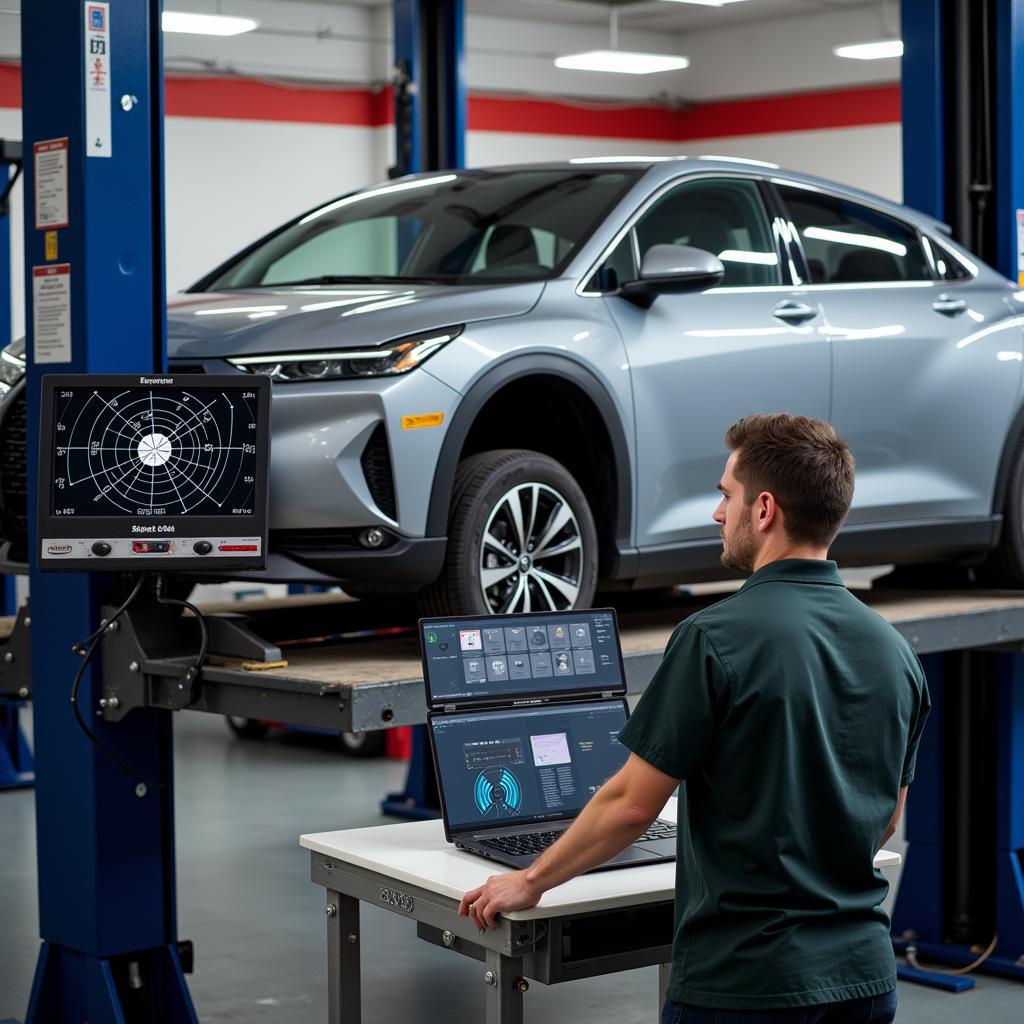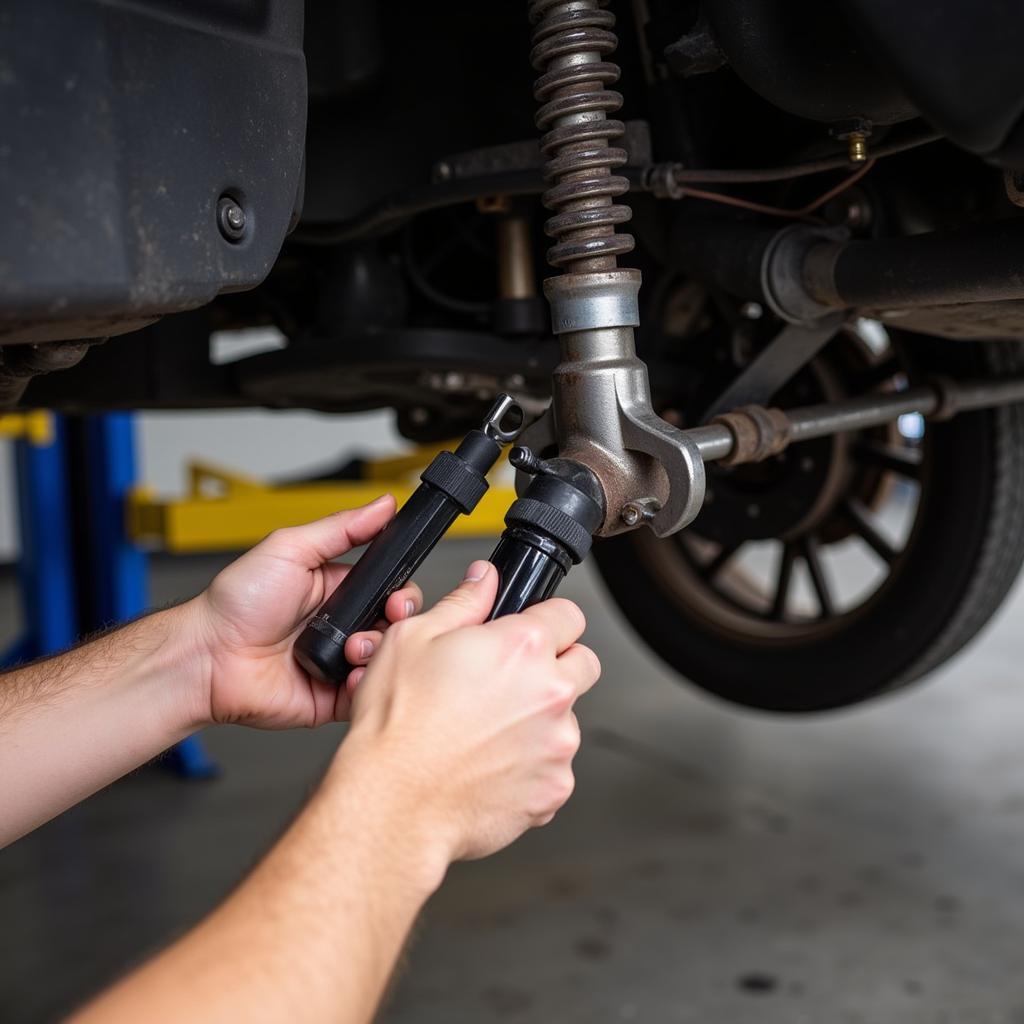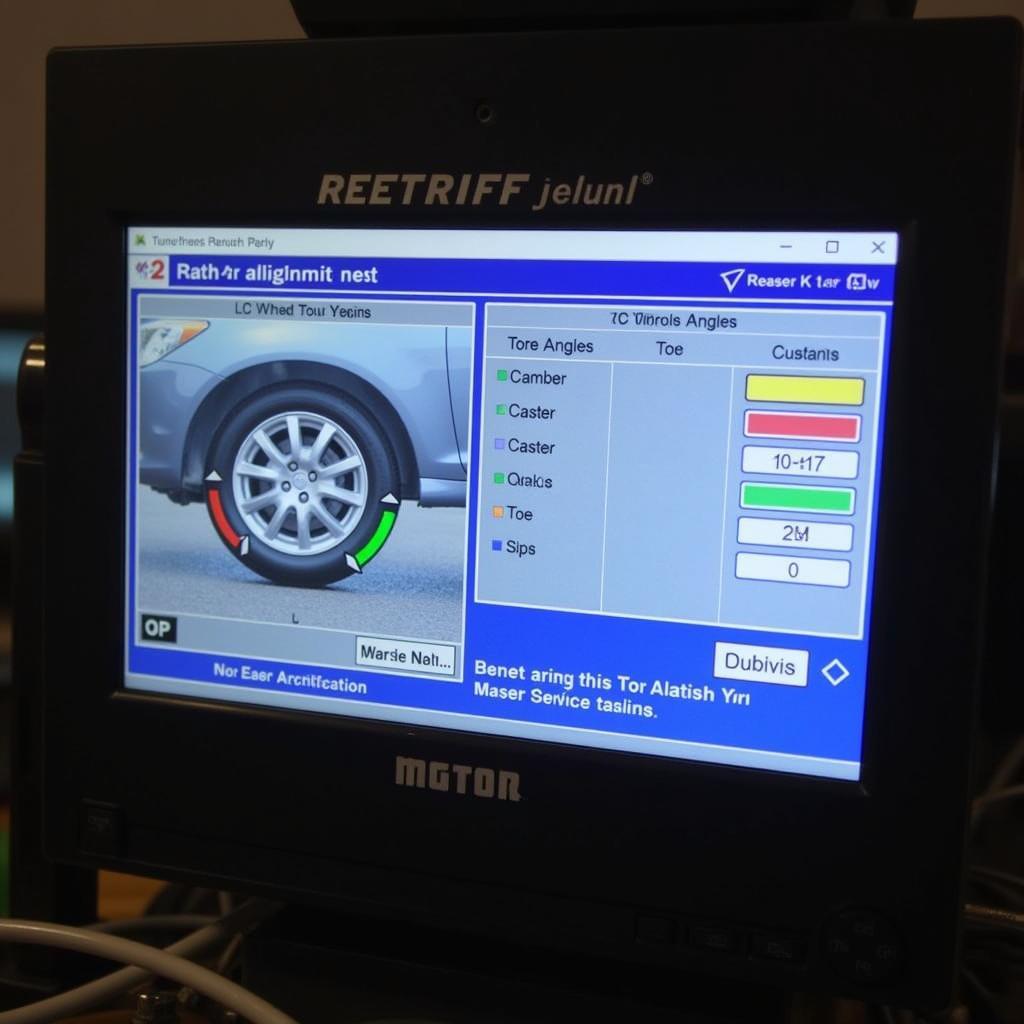A geometry diagnostic test, also known as a wheel alignment test, is a crucial car maintenance procedure that assesses the angles of your wheels and their relationship to the steering system and suspension. This test ensures optimal tire wear, handling, and overall vehicle safety. Neglecting this essential check can lead to uneven tire wear, reduced fuel efficiency, and compromised handling, ultimately affecting your safety on the road.
Understanding the Importance of a Geometry Diagnostic Test
Regular geometry diagnostic tests are vital for maintaining the health and performance of your vehicle. These tests help identify misalignments that can arise from everyday driving, hitting potholes, or even minor accidents. A proper alignment ensures that your tires make consistent contact with the road surface, optimizing tire lifespan, fuel economy, and overall driving experience.
What Does a Geometry Diagnostic Test Check?
A geometry diagnostic test analyzes three primary angles: camber, caster, and toe. Camber refers to the inward or outward tilt of the tire when viewed from the front. Caster is the angle of the steering axis when viewed from the side. Toe measures the difference in distance between the front of the tires and the back of the tires. These angles work in concert to influence how your car handles and responds to steering inputs.
A slight misalignment in any of these angles can have a significant impact on your car’s performance. For example, incorrect toe can cause the car to pull to one side, while improper camber can lead to premature tire wear. A professional mechanic uses specialized equipment to measure these angles precisely and adjust them according to the manufacturer’s specifications.
 Car Undergoing Geometry Diagnostic Test
Car Undergoing Geometry Diagnostic Test
When Should You Get a Geometry Diagnostic Test?
While it’s recommended to get a geometry diagnostic test annually, certain situations warrant more frequent checks. These include:
- After hitting a pothole or curb: Such impacts can significantly alter wheel alignment.
- Noticing uneven tire wear: Excessive wear on one side of the tire is a telltale sign of misalignment.
- The car pulling to one side: If your car drifts to one side while driving on a straight road, it’s crucial to get the alignment checked.
- After installing new tires or suspension components: These changes can affect the geometry of the vehicle.
- Following an accident: Even minor collisions can knock the wheels out of alignment.
Benefits of Regular Geometry Diagnostic Tests
Regular geometry diagnostic tests offer numerous benefits, including:
- Increased tire lifespan: Proper alignment reduces friction and wear, extending the life of your tires.
- Improved fuel efficiency: Reduced rolling resistance from aligned wheels optimizes fuel economy.
- Enhanced handling and stability: A correctly aligned vehicle responds predictably to steering inputs, improving control and stability.
- Increased safety: Proper alignment ensures optimal braking and handling performance, contributing to overall safety.
 Mechanic Adjusting Wheel Alignment
Mechanic Adjusting Wheel Alignment
Finding a Qualified Mechanic for Geometry Diagnostic Tests
Choosing a reputable mechanic with the right equipment and expertise is crucial for accurate geometry diagnostic tests. Look for shops that specialize in alignments and use modern computer-based alignment systems. These systems provide precise measurements and ensure accurate adjustments. Don’t hesitate to ask about their experience and certifications.
What to Expect During a Geometry Diagnostic Test
During the test, the mechanic will attach sensors to your wheels, which communicate with a computer system to measure the alignment angles. The system then displays the readings, allowing the mechanic to identify any deviations from the manufacturer’s specifications. The mechanic will then adjust the suspension components as needed to bring the wheels back into alignment.
“A proper geometry diagnostic test isn’t just about extending tire life; it’s about ensuring the safety and drivability of your vehicle,” says John Smith, ASE Certified Master Technician at Smith Automotive. “It’s a preventative measure that can save you money and headaches in the long run.”
 Computer Screen Showing Wheel Alignment Results
Computer Screen Showing Wheel Alignment Results
Conclusion
A Geometry Diagnostic Test For Cars is a critical aspect of vehicle maintenance. Regular checks ensure optimal tire wear, improved fuel efficiency, enhanced handling, and, most importantly, increased safety on the road. By understanding the importance of this test and finding a qualified mechanic, you can proactively maintain your vehicle’s performance and extend its lifespan. Don’t underestimate the impact of proper wheel alignment – it’s an investment in your car’s health and your safety.
FAQ
- How often should I get a geometry diagnostic test? Generally, once a year or after any significant impact or change to the suspension or tires.
- How long does a geometry diagnostic test take? Typically, between 30 minutes to an hour.
- What are the signs of misaligned wheels? Uneven tire wear, pulling to one side, and a crooked steering wheel are common indicators.
- How much does a geometry diagnostic test cost? The price varies depending on the location and the shop, but it typically ranges from $50 to $150.
- Can I drive with misaligned wheels? While it’s possible, it’s not recommended. Misalignment can lead to further damage and compromise safety.
- What is the difference between wheel alignment and wheel balancing? Alignment adjusts the angles of the wheels, while balancing ensures the weight is evenly distributed around the tire and wheel assembly.
- What happens during a geometry diagnostic test? A mechanic uses specialized equipment to measure the angles of your wheels and adjust them as needed.
“Regular maintenance, including geometry diagnostic tests, is the key to a long and healthy life for your car,” adds Maria Garcia, Lead Technician at Garcia Auto Repair. “Don’t wait until you experience problems; be proactive and schedule your check today.”
For further information related to car diagnostics, please explore other articles on DiagFixPro. We cover a wide range of topics to help you keep your vehicle in top condition.
When you need assistance, please contact us via WhatsApp: +1(641)206-8880 or Email: [email protected]. We have a 24/7 customer support team ready to help you.

Leave a Reply